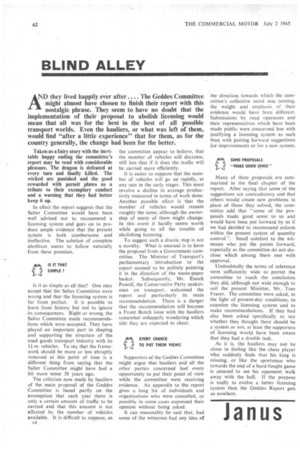BLIND ALLEY
Page 64

If you've noticed an error in this article please click here to report it so we can fix it.
ND they lived happily ever after. .... The Geddes Committee
might almost have chosen to finish their report with this nostalgic phrase. They seem to have no doubt that the implementation of their proposal to abolish licensing would mean that all was for the best in the best of all possible transport worlds. Even the hauliers, or what was left of them, would find "after a little experience" that for them, as for the country generally, the change had been for the better.
Taken as a fairy story with the inevitable happy ending the committee's report may be read with considerable pleasure. The dragon is defeated at every turn and finally killed. The wicked are punished and the good rewarded with permit plates as a tribute to their exemplary conduct and a warning that they had better keep it up.
In effect the report suggests that the Salter Committee would have been welt advised not to recommend a licensing system and goes on to produce ample evidence that the present system is both cumbersome and ineffective. The solution of complete abolition seems to follow naturally from these premises.
nIS IT THAT SIMPLE ? Is it as simple as all that? One may
accept that the Salter Committee were wrong and that the licensing system is far from perfect. It is possible to learn from history but not to ignore its consequences. Right or wrong, the Salter Committee made recommendations which were accepted. They have played an important part in shaping and supporting the structure of the road goods transport industry with its if m. vehicles. To say that the framework should be more or less abruptly removed at this point of time is a different thing from saying that the Salter Committee might have had a bit more sense 30 years ago.
The criticism now made by hauliers of the main proposal of the Geddes Committee is based partly on the assumption that each year there is only a certain amount of traffic to be carried and that this amount is not affected by the number of vehicles available. It is difficult to suppose, as F8 the committee appear to believe, that the number of vehicles will decrease, still less that if it does the traffic will be carried more efficiently.
It is easier to suppose that the number of vehicles will go up rapidly, at any rate in the early stages. This must involve a decline in average productivity measured in terms of work done. Another possible effect is that the number of vehicles would remain roughly the same, although the ownership of many of them might change. In this event it hardly seems worth while going to all the trouble of abolishing licensing.
To suggest such a drastic step is not a novelty. What is unusual is to have the proposal from a Government committee. The Minister of Transport's parliamentary introduction to the report seemed to be politely pointing it in the direction of the waste-paper basket. Subsequently, Mr. Enoch Powell, the Conservative Party spokesman on transport, welcomed the report and particularly its main recommendation. There is a danger that the recommendation will become a Front Bench issue with the hauliers somewhat unhappily wondering which side they are expected to cheer.
EVERY CHANCE TO PUT THEIR VIEWS
Supporters of the Geddes Committee might argue that hauliers and all the other parties concerned had every opportunity to put their point of view while the committee were receiving evidence. An appendix to the report gives a long list of individuals and organizations who were consulted, or possibly in some cases expressed their opinion without being asked.
It can reasonably be said that, had some of the witnesses had any idea of the direction towards which the committee's collective mind was turning, the weight and emphasis of their evidence would have been different Submissions by road operators and their representatives which have been made public were concerned less with justifying a licensing system as such than with putting forward suggestions for improvements or for a new system.
SOME PROPOSALS "MAKE GOOD SENSE"
Many of these proposals are summarized in the final chapter of the report. After saying that some of the suggestions are contradictory and that others would create new problems in Place of those they solved, the committee add that "some of the proposals made good sense to us and would have been out forward by us if we had decided to recommend reform within the present system of quantity control ". Small comfort to the witnesses who put the points forward, especially as the committee do not disclose which among them met with approval.
Undoubtedly the terms of reference were sufficiently wide to permit the committee to reach the conclusion they did, although not wide enough to suit the present Minister, Mr. Tom Fraser. The committee were asked, in the fight of present-day conditions, to examine the licensing system and to make recommendations. If they had also been asked specifically to say whether they thought there should be a system or not, at least the supporters of licensing would have been aware that they had a double task.
As it is, the hauliers may not be alone in feeling like the chess player who suddenly finds that his king is missing, or like the sportsman who towards the end of a hard-fought game is amazed to see his opponent walk away with the ball. If the purpose is really to evolve a better licensing system then the Geddes Report gets us nowhere.
Janus
























































































































